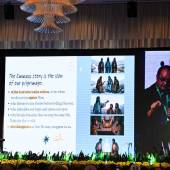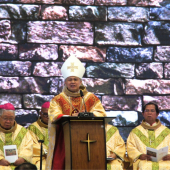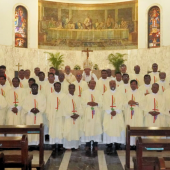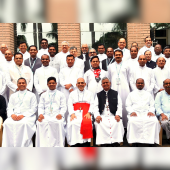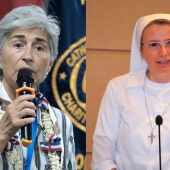Enlarge the Space of Your Tent (Isaiah 54:2)
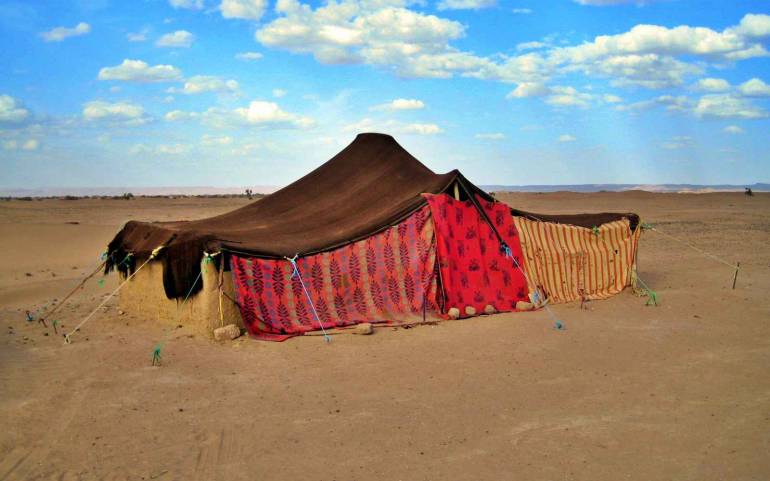
Have you ever lived in a tent? If not, it is worth trying. Camping with friends in a tent can be a unique experience. You will remember it and cherish the experience.
When those who prepared the Synod document for the continental stage chose for its title a phrase from Prophet Isaiah, Enlarge the space of your tent (Is 54:2) my thoughts went wandering to happy memories of the days I lived in a tent. I had never written or shared about it but the title of the Synod document triggered in my mind fresh memories of the bygone days. I felt I should share it with others.
In school I was a boy scout and when I joined the seminary I thought I would not any more have the joy of scouting. I was mistaken. As a young cleric in regency, and as a student of theology and as a priest, I was very much involved in scouting. Camping and hiking were part of my ministry. But the most memorable of the camp life was training scout masters. These camps usually lasted two weeks, but sometimes we would have two training camps back-to-back. So for the duration of a month, we would be living in tents at a large wooded camp site far away from the city. The trainers as well as trainees would live in tents during the whole duration of the camp.
We used to pitch a tent somewhere at the centre of the camp site. This tent would serve as the camp head office during the day and dormitory for the camp chief and other trainers at night. The trainees, who were either young religious brothers or teachers from various schools, would have their tents pitched several feet apart from each other, but equidistance from the main area of a large open ground where we held the training sessions, games and other activities.
There would be four or six patrols as per the number of trainees. The camp started with a hands-on session on how to pitch a tent. We would demonstrate to the trainees how to do it, and how to maintain it daily throughout the period of the camp. They were also taught how to take it down, fold it and carry it and pitch it at another location.
Living in a tent is a unique experience. If you never had an experience of living in a tent it is worth trying it sometime. Go out with friends on a hike or join a scout troop and camp with them outdoors and try to pitch a tent and live in it. Discover the joy of a ‘tent-life experience’.
The tent is special in many ways. Unlike a regular house, it has no doors or windows, walls, or rooms or toilets. There are no beds, chairs and tables. It is an open space. In any given day, it can take in one more person. It is ever expandable. One will seldom hear words like ‘sorry, there is no room’ or ‘houseful’. Those live in tents know they have to have some kind of affinity, affection, sense of fellowship with those who live together. They are also aware that a tent is not a permanent place. The stay is short, and the tents will be plucked up and moved as the need arises.
Biblical Image of the Tent
In the ancient Middle East, many people spent at least part of their time moving from place to place and dwelling in tents, so it was a very familiar way of life. For the Israelites too who journeyed for long years in the desert on their way to the Promised Land, the tent experience was not alien. The earliest books of the Old Testament contain detailed descriptions of living in the tent. Abraham, Isaac, and Jacob lived mostly in tents. Moses too had his tent wherever the Israelites camped. David pitched a tent and brought the Ark of the Covenant in it.
Those who are involved in leading the Synod process chose the theme of the tent for the Document for the Continental Stage (DCS) and called it “Enlarge the Space of your Tent”. They chose Isaiah 54:2 as a title for the document prepared as a fruit of the reflections gathered from the episcopal conferences of the world as well as groups such as the associations of the consecrated life, Vatican curia offices etc. In Isaiah ’s day his listeners would easily understand the significance of the tent, and the call to expand and make space for others.
The imagery of the tent is significant for us too. The Church is like a tent which gives us shelter, which has always the possibility to enlarge, to make space for others. Those who live in tents are accommodative. They have a great sense of hospitality. There is a great deal of trust among the inhabitants of a tent. They are willing to share what they have with the sojourner. They are sensitive to the plight of the other, the one who is in need. Tent dwellers are aware of the impermanence of life and the need for mutual dependence and support.
The Old Testament has many references on welcoming the foreigners, sojourners, the strangers. The Lord appeared to Abraham by the oaks of Mamre, while he was sitting at the tent door in the heat of the day. Abraham’s generosity is unbounded even when he did not know the identity of his visitors. Abraham prevails on them to enjoy his hospitality. Later he learns that the Lord was the one who had come to visit him. He is blessed with a son. Abraham and Sarah knew God was faithful to his promise. Their joy knew no bounds.
In describing the incarnation of Christ, the expression ‘the word became flesh and dwelt among us’ is sometimes translated as ‘he pitched his tent among us’. Someone coming to dwell with us in our tent is a special guest with whom we will have a special bonding. Christ did not come as a casual visitor, but an ‘indweller’, a fellow pilgrim, a God who comes to inhabit with us.
Paul, one of Christ’s most ardent followers, was a tent maker and earned his livelihood with the trade. He surely knew what it means to pitch a tent and live in it. He preached the Gospel and proclaimed the Lord across a vast territory of the Greco-Roman world. He was enlarging the space of the tent, the Church, thorough his missionary journeys. A church without discrimination of Jew or gentile, slave or free ones. In a world and even Church which is divided on many discriminatory elements, Paul’s call to be one in Christ and shun all divisions has not lost its relevance.
How do we as a Church enlarge the space of our tent today? It means being more inclusive, welcoming, creating space for others. Avoiding ‘exclusion’ and neglect, eschewing discriminations based on colour, nationality, status. It means not passing by the wounded man on the highway but stopping to lift him up and bandage his wounds, taking him to the inn and caring for him. It involves setting aside our other pre-occupations, and appointments. We do not engage in ‘good neighborliness’ as a part time activity, when we are free, when we have some time to spare, when we are financially better off. It is an attitude of the heart to sense the needs of our neighbour.
Not Leaving people behind
A Synodal journey entails going along together, taking along everyone, and not leaving behind anyone - the weak, the feeble, the helpless, those who struggle to walk. The word ‘synod’ has the connotation of doing something together. It is more than doling out gifts and assistance. Like the Good Samaritan, it means getting down from horse, lifting the one who is wounded and fallen by the wayside, bandaging his wounds, taking him to the inn and making arrangements for him. It involves risks, it entails costs. It surely demands time and patience but above all the heart of the Good Samaritan, the heart of a loving and merciful God.
The Synod is a journey. We walk along together - not ahead, not behind, but side by side. That happens when we pay attention to the three key words of the Synodal theme: communion, participation, mission.
Marauding armies led by ambitious conquerors in their quest for victory have often killed and disposed of wounded or feeble soldiers. People fleeing to safety during wars or natural disasters have sometimes left behind those who cannot cope with the speedy evacuation. They ‘sacrifice’ the weak, the feeble, the aged, the helpless, the vulnerable to secure their own safe passage. They are led by the instinct for self-preservation at the cost of the lives of others.
We in our times witness this happening in other forms of abandonment. Neglecting the old to live and die alone, people who are terminally ill or handicapped being left out or forced to choose euthanasia. The road from Jerusalem to Jericho today has so many people in need of help. In the race for life in modern times, many people seem to be out of step. They cannot cope with the speed. Society adopts the ideology of utilitarianism and people become a cog in a wheel, they are counted only for what they can earn or produce. They are judged by their usefulness and not their intrinsic worth as brothers and sisters, parents and elders, children of God. Pope Francis calls it the “throw away culture.”
One of the much-loved icons of charity in our times is Mother Teresa. She saw Christ in the poorest of the poor. In Christ’s cry from the Cross, “I thirst” she heard the cry of those who are dying in the streets from hunger and loneliness. She and her followers, the Missionaries of Charity, taught us how to love with the heart of Christ, how to give until it hurts. She inspired us and showed the world and all of us how to live the gospel in our times. The scriptures continue to admonish us: “Harden not your hearts but listen to the voice of the Lord.”
###
Radio Veritas Asia (RVA), a media platform of the Catholic Church, aims to share Christ. RVA started in 1969 as a continental Catholic radio station to serve Asian countries in their respective local language, thus earning the tag “the Voice of Asian Christianity.” Responding to the emerging context, RVA embraced media platforms to connect with the global Asian audience via its 21 language websites and various social media platforms.









